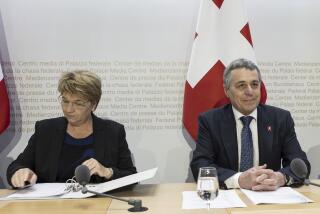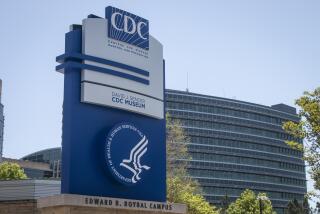Boycott of Conference on AIDS Is Downplayed : Medicine: Organizers expect session to highlight strides but few if any breakthroughs in fight against disease.
- Share via
SAN FRANCISCO — The sixth International Conference on AIDS will highlight “important strides”--but few if any breakthroughs--in AIDS research, prevention and care, organizers said Wednesday in unveiling the program for the gathering in June.
At a press conference at UC San Francisco designed to shift attention from the widely publicized boycott of the conference to the program itself, Dr. Robert Wachter, the program director, said the impact of the protest “has not been profound.”
Although about 100 groups from around the world have pulled out of the conference to protest U.S. entry restrictions on foreigners with AIDS and the underlying human immunodeficiency virus, only three of 60 speakers who were invited to address conference plenary sessions refused to speak, Wachter said.
Authors of about 20 research abstracts--out of a total of 4,900 that were submitted--have withdrawn their work to dramatize their unhappiness with U.S. policies, he added.
“We regret this very much,” said Dr. John Ziegler, conference co-chairman. “We are in sympathy with their cause, but the conference must go on.”
Conference organizers seemed especially relieved that European scientists, including HIV discoverer Dr. Luc Montagnier of France’s Institut Pasteur, decided to attend after mulling the possibility of holding their own breakaway meeting overseas.
Last month, the Bush Administration eased entrance restrictions on HIV-infected people coming to the United States to attend scientific conferences, but the move did not mollify activists who consider the restrictions medically unnecessary, demeaning and discriminatory.
Most of those boycotting are members of community-based organizations in the United States and overseas. On Wednesday, New York’s Gay Men’s Health Crisis, the pioneering AIDS services and prevention organization, joined the list of groups planning to forgo the meeting.
“Though the conference may not achieve the mix of scientists and community-based AIDS workers we envisioned in early planning, we are confident that more than 10,000 participants will be registered,” Ziegler said.
Others said the conference may even achieve its original goal of 12,000 researchers, AIDS workers and policy makers. As in the past, the gathering will be divided into several tracks: basic science, clinical science and trials, epidemiology and prevention, and social science and public policy.
In tempering expectations for a “breakthrough,” Dr. Paul Volberding, conference co-chairman, noted that with so many lives at stake it would be unethical for scientists to withhold dramatic news until the conference.
More to Read
Sign up for Essential California
The most important California stories and recommendations in your inbox every morning.
You may occasionally receive promotional content from the Los Angeles Times.













